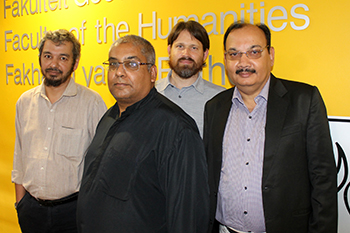Latest News Archive
Please select Category, Year, and then Month to display items
![]()
#UFSupdate (18 March 2020): UFS IMPLEMENTS MEASURES TO MINIMISE RISK OF COVID-19 TO STAFF
STATEMENT BY PROF FRANCIS PETERSEN, RECTOR AND VICE-CHANCELLOR
The executive management of the University of the Free State (UFS) welcomes the announcement of Dr Blade Nzimande, Minister of Higher Education, Science and Technology on 17 March 2020 that all post-school training institutions will have an early recess, starting on 18 March 2020. The Minister’s directive that universities should minimise risk of COVID-19 to all its staff during this time is also welcomed.
The announcement of Dr Nzimande is in line with the university’s decision on 16 March 2020 to suspend the academic programme as from 17 March 2020 and to resume it again on 14 April 2020.
It is important for us all to know that this is not business as usual, and that different thinking is required. Responsible citizenship is one of the crucial elements the world has increasingly been experiencing for the past few weeks. This is why we must act out our responsibility towards one another by focusing on ways in which social distancing can be achieved – especially during this low-risk period that South Africa is still experiencing. This is one of the reasons that informed the university’s decision on 16 March 2020 week to suspend the academic programme and also for students to vacate the residences by 20 March 2020.
The health and well-being of our staff members are equally important. The university’s Employee Task Team that was established on 16 March 2020 analysed options for the continuation of university operations during the recess period. These options were submitted to the executive management, discussed with the Chairperson of the UFS Council and approved on 18 March 2020.
Staff members who have children at school and pre-school may work from home on 19 and 20 March 2020. For the period 23 March 2020 to 13 April 2020, the number of staff members present on all three campuses will be reduced to a minimum and staff members may be allowed to work from home where practically possible.
Arrangements have been made to accommodate those staff members who are performing services which cannot be done from home (such as cleaning, gardening, maintenance, sports, etc) in a flexible and reasonable way. Similar arrangements will be made with office-based support services staff, prioritising institutional needs and based on humane and personal circumstances. Academic staff have been requested to ensure that the online learning materials are finalised and made available for the online learning platform.
The decision for employees to work from home is based on the premise that all employees are deemed to be at work from 23 March 2020 to 13 April 2020. This requires staff members to be available and contactable by line managers at all times during the university’s normal working hours.
I am comfortable that these measures will alleviate the concerns from our staff regarding the spreading of COVID-19 and the risk to themselves without compromising university operations.
Prof F W Petersen
Rector and Vice-Chancellor
University of the Free State
SA and Africa must avoid going over the edge
2017-02-26

From left are: Prof JM Moosa (Centre for African
Studies, Jawaharlal Nehru University, India),
Prof Hussein Solomon (Senior Professor: Political
Studies and Governance at the UFS),
Prof Virgil Hawkins (Osaka School of International
Public Policy Studies, Osaka University in Japan), and
Prof Ajay Dubey (Centre for African Studies, Jawaharlal Nehru
University, India).
Photo: Jóhann Thormählen
South Africa and the rest of Africa might be standing on the edge of a cliff and therefore conversations are necessary to avoid tipping over. According to Prof Hussein Solomon that was why a conference to address these issues was recently co-hosted by the University of the Free State (UFS).
Prof Solomon, Senior Professor of Political Studies and Governance at the UFS, said the continent and country needed to make the right decisions. “These right choices refer to the correct economic, political, and social policies.”
International delegates attend
Delegates from India, Japan, Zambia, Lesotho and South Africa attended the conference, called A View from the Precipice: Critical Reflections on South Africa and Africa in the 21st Century, on 13 and 14 February 2017 on the Bloemfontein Campus. It was co-hosted by the UFS Department of Political Studies and Governance, Jawaharlal Nehru University (India), Centre for the Engagement on African Peace and Security, Southern African Centre for Collaboration on Peace and Security and Osaka University (Japan).
Prof Solomon said external actors provided a useful mirror as they gave an idea of how Africa and South Africa were viewed from abroad.
Creating a knowledge-sharing forum
“It is not just about sharing knowledge, but creating a forum for sharing knowledge,” said Prof Virgil Hawkins from the Osaka School of International Public Policy Studies.
Prof Hawkins, who is a visiting professor at the UFS, said a conference like this was one of the cornerstones of the relationship between the UFS and Osaka University. Prof Solomon is also a visiting professor at last mentioned university.
Highlights of conference
Prof Solomon said some of the discussions included that “the ANC government is in crisis and is dragging the rest of the country with it”. Another participant said that 80% of the jobs in the next 20 years had not been created yet – which put the relevance of tertiary education in the spotlight.